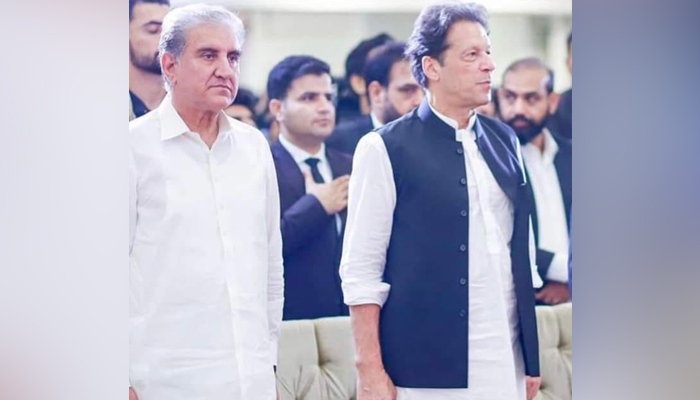Imran Khan, Shah Mehmood Qureshi bail pleas rejected in cipher case
Earlier, court reserved verdict after PTI counsel completed their arguments for grant of bail to Khan and Shah Mehmood
ISLAMABAD: Special Court Judge Abual Hasnat Zulqarnain rejected the post-arrest bail pleas of former premier Imran Khan and former foreign minister Shah Mehmood Qureshi in the cipher case, here on Thursday.
Earlier, the court had reserved the verdict after the PTI counsel completed their arguments for grant of bail to Imran Khan and Shah Mehmood. Later, the judge announced the verdict, rejecting their bail pleas.
On the other hand, the court, constituted under the Official Secrets Act, approved Asad Umar’s bail in the case related to US cipher after a prosecutor told the judge that his arrest was not required at this stage. Judge Zulqarnain approved the PTI leader’s bail against a surety bond of Rs50,000 and also noted that Umar expressed willingness to join the cipher probe, but the prosecution did not investigate him. “If Asad Umar’s arrest is required, the Federal Investigation Agency will proceed according to the law,” he ordered. The court also directed the FIA to inform the PTI leader in advance before arresting him in the case.
Earlier, during the hearing of bail pleas, Imran’s counsel maintained that the PTI chairman had been subjected to unprecedented political victimisation, saying 180 cases lodged against him, with over 140 registered before his arrest.
The defence argued that the entire cabinet would have to be implicated as the case could not be assigned to one individual while referring to meetings held by the National Security Council during which the cipher was discussed. Imran’s lawyer contended that keeping documents safe was not the prime minister’s job but the duty of his principal secretary.
At one point during the hearing, the judge questioned how the cipher went missing when it was a classified document. He observed that copies of the diplomatic cable held by the army chief, the DG ISI and the foreign ministry were not the same. Questions were also raised by the defence counsel over former principal secretary Azam Khan’s whereabouts. After the completion of arguments by the counsel, the court reserved its verdict for a short while. Later, the court rejected both bail pleas. Imran Khan and Shah Mehmood Qureshi were sent into judicial custody till September 26.
Last month, the FIA had booked PTI Chairman Imran Khan and the party’s vice chairman Shah Mehmood Qureshi under the Official Secrets Act for allegedly misplacing and misusing classified documents for vested interests.
In a related development, the Supreme Court Registrar’s office returned with objections a petition of Pakistan Tehreek-e-Insaf (PTI) Chairman Imran Khan seeking general election in 90 days. The petition had been filed with the apex court through the party’s General Secretary Omar Ayub under Article 184(3) of the Constitution, praying for declaring a decision of purported Council of Common Interests on August 5 approving the census as as illegal and void ab initio.
The Registrar’s office returned the petition by raising objections that the petitioners had not pointed out as to what questions of public importance in the instant case were involved with reference to enforcement of any of the fundamental rights, guaranteed under the Constitution, so as to directly invoke jurisdiction of the Supreme Court under Article 184(3) of the Constitution.
The registrar objected that the ingredients for invoking extraordinary jurisdiction of the Court under Article 184(3) of the Constitution had not been satisfied. That the President of Pakistan had been impleaded as respondent No. 7, though he could not be impleaded as a party under Article 248 of the Constitution. Similarly, it was objected that notices issued to the respondents were not properly drawn, as it was not mentioned therein for what purpose, the constitutional petition was being filed before the court, nor a copy of the petition had been provided to the respondent.
The Registrar’s office further objected that the petitioners had not approached any other appropriate forum available under the law for the same relief and also had not provided any justification for not doing so. It was further objected that multifarious prayers had been made in one constitutional petition.
-
 Cardi B Hits Back Hard At Critics Of Her Little Miss Drama Tour
Cardi B Hits Back Hard At Critics Of Her Little Miss Drama Tour -
 King Charles Sees Andrew Going To Jail As Chance To Protect Monarchy
King Charles Sees Andrew Going To Jail As Chance To Protect Monarchy -
 NJ Transit Bus And Train Lines Operating Again On Modified Schedule After Winter Storm
NJ Transit Bus And Train Lines Operating Again On Modified Schedule After Winter Storm -
 Peter Mandelson Freed On Bail Following Arrest In Public Office Misconduct Case Linked To Epstein
Peter Mandelson Freed On Bail Following Arrest In Public Office Misconduct Case Linked To Epstein -
 Trump Warns Trading Partners: Countries 'playing Games’ After Court Ruling Will Face Even Higher Tariffs
Trump Warns Trading Partners: Countries 'playing Games’ After Court Ruling Will Face Even Higher Tariffs -
 Robert Carradine, 'Revenge Of The Nerds' Star, Passes Away At 71 After Decades-long Battle With Bipolar Disorder
Robert Carradine, 'Revenge Of The Nerds' Star, Passes Away At 71 After Decades-long Battle With Bipolar Disorder -
 Alex De Minaur Faces Surprise Elimination In Acapulco Thriller By Patrick Kypson
Alex De Minaur Faces Surprise Elimination In Acapulco Thriller By Patrick Kypson -
 Ethan Hawke Raises Eyebrows With Risque Response To Question About Eating In Bed
Ethan Hawke Raises Eyebrows With Risque Response To Question About Eating In Bed -
 Princess Beatrice, Eugenie Enter Crisis Talks As Parents Sins Start Bleeding Onto Them: ‘Help Me Girls!’
Princess Beatrice, Eugenie Enter Crisis Talks As Parents Sins Start Bleeding Onto Them: ‘Help Me Girls!’ -
 US Ambassador To France Charles Kushner Barred From Meeting French Government After Missing Meeting
US Ambassador To France Charles Kushner Barred From Meeting French Government After Missing Meeting -
 Moby Sings Praises Of Eminem After Calling Rapper 'misogynist, Homophobe, Racist And Antisemite' 25 Years Ago
Moby Sings Praises Of Eminem After Calling Rapper 'misogynist, Homophobe, Racist And Antisemite' 25 Years Ago -
 'Tediously Monastic' Moby Reveals How Spiritual Discipline Impacted His Love Life
'Tediously Monastic' Moby Reveals How Spiritual Discipline Impacted His Love Life -
 New Zealand PM Christopher Luxon Backs Removing Ex-Prince Andrew From Line Of Succession
New Zealand PM Christopher Luxon Backs Removing Ex-Prince Andrew From Line Of Succession -
 Bella Hadid Looks Back On Opportunities She Lost In A Year Amid Lyme Treatment
Bella Hadid Looks Back On Opportunities She Lost In A Year Amid Lyme Treatment -
 Meghan Markle’s Family Shares Important News Amid Estrangement
Meghan Markle’s Family Shares Important News Amid Estrangement -
 Charley Crockett's Canadian Tour Cancelled After Being Denied Entry Into Canada Over Past Felony Conviction
Charley Crockett's Canadian Tour Cancelled After Being Denied Entry Into Canada Over Past Felony Conviction




